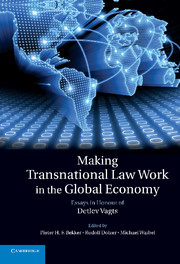Book contents
- Frontmatter
- Contents
- List of contributors
- Foreword: the transnationalism of Detlev Vagts
- List of cases cited
- List of abbreviations and acronyms
- Introduction: a Festschrift to celebrate Detlev Vagts' contributions to transnational law
- 1 Detlev Vagts and the Harvard Law School
- 2 Constructing and developing transnational law: the contribution of Detlev Vagts
- I International law in general
- II Transnational economic law
- 14 Sovereignty-plus in the era of interdependence: toward an international convention on combating human rights violations by Transnational Corporations
- 15 The noisy secrecy: Swiss banking law in international dispute
- 16 Not-for-profit organisations, conflicts of laws and the right of establishment under the EC Treaty
- 17 The meaning of ‘investment’ in the ICSID Convention
- 18 Toward a proper perspective of the private company's distinctiveness
- 19 Administrative law and international law: the encounter of an odd couple
- 20 Making transnational law work through regime-building: the case of international investment law
- 21 Creditor protection in international law
- 22 Stability, integration and political modalities: some American reflections on the European project after the financial crisis
- III Transnational lawyering and dispute resolution
- Bibliography of Detlev Vagts
- Index
15 - The noisy secrecy: Swiss banking law in international dispute
from II - Transnational economic law
Published online by Cambridge University Press: 17 November 2010
- Frontmatter
- Contents
- List of contributors
- Foreword: the transnationalism of Detlev Vagts
- List of cases cited
- List of abbreviations and acronyms
- Introduction: a Festschrift to celebrate Detlev Vagts' contributions to transnational law
- 1 Detlev Vagts and the Harvard Law School
- 2 Constructing and developing transnational law: the contribution of Detlev Vagts
- I International law in general
- II Transnational economic law
- 14 Sovereignty-plus in the era of interdependence: toward an international convention on combating human rights violations by Transnational Corporations
- 15 The noisy secrecy: Swiss banking law in international dispute
- 16 Not-for-profit organisations, conflicts of laws and the right of establishment under the EC Treaty
- 17 The meaning of ‘investment’ in the ICSID Convention
- 18 Toward a proper perspective of the private company's distinctiveness
- 19 Administrative law and international law: the encounter of an odd couple
- 20 Making transnational law work through regime-building: the case of international investment law
- 21 Creditor protection in international law
- 22 Stability, integration and political modalities: some American reflections on the European project after the financial crisis
- III Transnational lawyering and dispute resolution
- Bibliography of Detlev Vagts
- Index
Summary
Introduction
I did not choose the subject of this chapter just for its current relevance, but in an attempt to reflect a lesson which I learned from Detlev Vagts. I remember, among other lessons, a specific one in the context of the dispute regarding accounts of Holocaust victims held with Swiss banks. He argued on pertinent issues of international law for the banks and showed how a jurist can be truly independent from all the semi-truths typically associated with that kind of case. Detlev Vagts can draw from his roots a rarely found ability to ‘think international’. But there is more to it: he personifies the power of pure juridical argument over politics.
At the time of writing of this chapter addressing the subject of Swiss banks, the case pursued by the US Internal Revenue Service (IRS) against Union Bank of Switzerland (UBS), which presently is Switzerland's biggest bank, is in the process of settlement. But there is also pressure from the EU and the OECD, and litigation may continue in the United States. I will not describe all the ramifications of the UBS litigation, which of course are manifold. Instead, I will attempt to offer a bird's-eye view. I am confident that my observations will retain some of their relevance after the specific cases have been settled in one way or another.
- Type
- Chapter
- Information
- Making Transnational Law Work in the Global EconomyEssays in Honour of Detlev Vagts, pp. 285 - 297Publisher: Cambridge University PressPrint publication year: 2010



